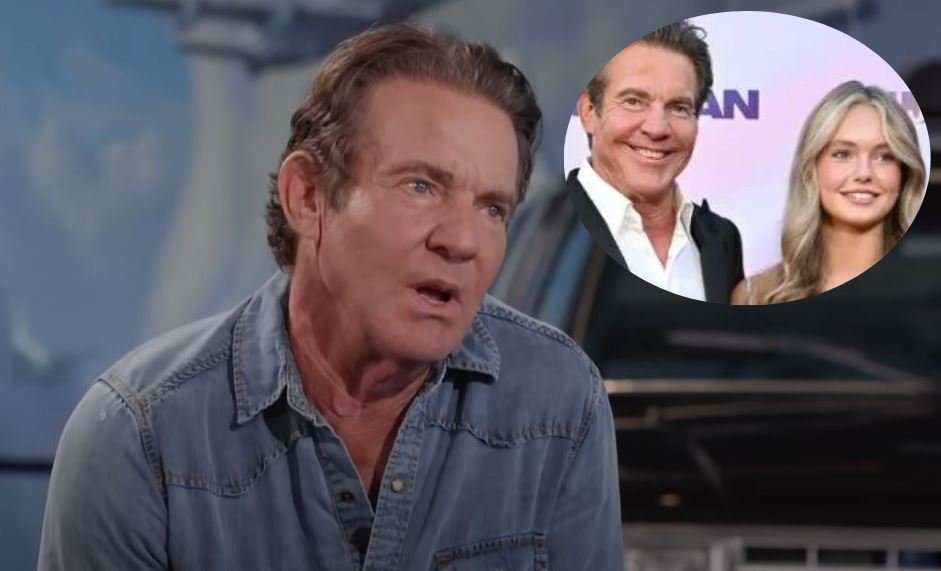
Dennis Quaid was reminded during the week that a portion of the Texas Hill Country was devastated by floodwaters that fame does not provide a safe haven from terror. Zoe, a 17-year-old summer camp counselor, was staying close to Camp Mystic, where a catastrophic flood killed more than 120 people. That night’s news was too close for comfort.
Speaking openly on Hannity, Quaid said he didn’t get much sleep that night and kept reaching for his phone. His voice was steady but clearly shaken as he stated, “I knew she wasn’t at the exact site, but she was close enough.” “Nothing settles in you until you hear your child’s voice.” Any parent can relate to that instinct—the mixture of fear and love.
Dennis Quaid & Family Overview
| Detail | Information |
|---|---|
| Full Name | Dennis William Quaid |
| Birth Date | April 9, 1954 |
| Daughter in Focus | Zoe Grace Quaid (born 2007), age 17 |
| Other Children | Jack Quaid (with Meg Ryan), Thomas Boone Quaid (twin of Zoe) |
| Daughter’s Role | Summer camp counselor in Texas Hill Country |
| Camp Location | Approximately 75 miles north of Kerrville, Texas |
| Notable Incident | Texas flood tragedy in July 2025 near Camp Mystic |
| Recent Public Statement | Shared on Fox News’ Hannity, July 11, 2025 |
| Connection to Victims | Counselor friend lost family, NFL friend Clark Hunt lost young relative |
| Notable Films | The Parent Trap, The Rookie, Sovereign |
Having gone to the same camp as a child, Zoe had returned that summer to lead and mentor others rather than for fun. Her role as a counselor represents a turning point in life that many teenagers strive for. However, tragedy befell this rite of passage. One of Zoe’s friends, a counselor, lost her family when the same river that used to make campers happy washed them away in an RV.
Dennis Quaid has served in a variety of capacities over the last few decades, from national leaders to devoted fathers. Still, no screenplay could capture the depth of the real-life fear of losing his daughter. His words conveyed a sense of both the moment’s helplessness and the subsequent gratitude. “Zoe was all right,” he said. Others, however, weren’t.
His focus shifted from individual relief to communal grief by July 11. He offered his sympathies to Clark Hunt, a co-owner of the Kansas City Chiefs, whose young relative Janie was one of the youngest people killed in the flood. Quaid’s statement, “There are still many people who need to be prayed for,” was incredibly human and neither practiced nor polished.
In an interview with Today that same week, Jenna Bush Hager broke down as she described how she had only days before dropped off her daughters at another camp in Texas. Her narrative, when combined with Quaid’s, provides a more comprehensive view of the psychological burden that many parents are bearing in the wake of this tragedy.
Since then, the disappearances and deaths have raised questions about safety regulations. Cabins at Camp Mystic reportedly passed state safety inspections just 48 hours before the disaster occurred, despite being situated in high-risk flood zones. It is painfully sobering to realize that the water ignores the irony of the paperwork clearing them.
Flood recovery efforts have been actively supported by Quaid and others through public appeals for assistance and cooperation with local authorities. Alongside him, his wife Laura Savoie promoted donations to regional relief initiatives. Their participation offers a meaningful yet intimate gesture that is based on community rather than celebrity.
For Zoe, the summer will probably be remembered for her quiet fortitude rather than campfires or laughter by the lake. Teenage camp counselors in particular are frequently viewed by younger campers as the energetic older sibling. However, in times of crisis, they may play a variety of roles, including surrogate protectors, emotional support systems, and first responders. Zoe was called to mature quickly, just like a lot of other people that week.
Texas camps have long been praised for being places where friendships are made for life and character is developed. Grief, however, has eclipsed those customs in recent years. Nevertheless, a feeling of rejuvenation is beginning to emerge. These days, parents ask more intelligent questions. Camp managers are reviewing emergency preparations and site selection. Even though change is long overdue, it is finally happening.
As he thought back on the event, Quaid highlighted the resilience of families—both his own and those grieving for a loved one. “You give your children a stronger hug,” he remarked. “You feel a tremendous obligation to speak up—for those who are no longer able to—but you are also thankful.”
This near-miss teaches us more than just geography and weather patterns. It has to do with presence. It’s about the power of communication, voice, and late-night calls that bring relief instead of sadness. And it’s about what we do next: how leaders transform their suffering into policy, how teens cope with trauma, and how communities recover.
This tale, set in a camp far from the bustle of Hollywood, serves as a reminder of how abruptly life can change. but also the strength of people’s reactions. Dennis Quaid, whose filmography has endured for generations, has now left behind what may be a more enduring impression: a message of tempered optimism, paternal love, and unwavering compassion.
Zoe and thousands of others like her will go back to school and live their lives, maybe altered but not destroyed, in the weeks ahead as communities clean up and families come together to remember the deceased. Their stories, which are still being told, are worthy of being heard.
